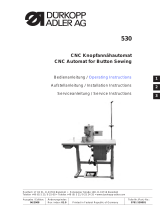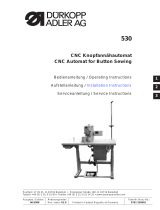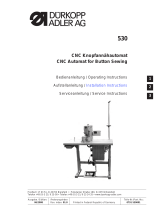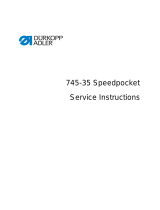
Contents
2 Service Instructions 512/532 Version 01.0 - 07/2015
11.5.3 Converting the buttonhole gap (class 532)................................. 38
11.5.4 Converting the backtack dimensions (class 512) ....................... 38
11.6 Setting the speed........................................................................ 39
11.7 Checking the sewing pattern ...................................................... 39
11.8 Changing the sewing pattern...................................................... 39
11.9 Winding....................................................................................... 40
11.10 Sewing........................................................................................ 40
11.11 Counter....................................................................................... 41
11.12 Interrupting sewing ..................................................................... 41
11.13 Protecting standard sewing patterns .......................................... 41
11.14 Storing sewing patterns .............................................................. 42
11.14.1Mapping memory buttons .......................................................... 42
11.14.2Sewing with memory buttons..................................................... 43
11.14.3Deleting the memory button assignments ................................. 43
11.15 Storing sewing pattern sequences ............................................. 43
11.16 Processing sewing pattern sequences ....................................... 44
11.17 Deleting sewing pattern sequences............................................ 44
11.18 Stopping sewing ......................................................................... 45
11.19 Editing parameters in the memory.............................................. 45
11.19.1Editing parameters in level M1 .................................................. 45
11.19.2Editing parameters in level M2 .................................................. 46
11.20 Resetting parameters to factory settings .................................... 46
11.21 Editing sewing patterns externally .............................................. 47
11.22 Working with a USB stick ........................................................... 48
11.23 Error messages .......................................................................... 50
11.24 Loading software via a USB stick ............................................... 53
11.24.1Loading the main program......................................................... 53
11.24.2Loading sewing patterns............................................................ 53
11.24.3Setting parameter U085 (class 532).......................................... 54
11.24.4Checking the software version................................................... 54
12 Service settings via software .................................................. 55
12.1 Basic software operation ............................................................ 55
12.2 Accessing the technician level.................................................... 56
12.2.1 Editing parameters in level 1 ...................................................... 56
12.2.2 Editing parameters in level 2 ...................................................... 56
12.3 Setting the blade position ........................................................... 57
12.4 Loading software via a USB stick ............................................... 59
12.4.1 Loading the main program.......................................................... 59
12.4.2 Loading sewing patterns............................................................. 59
12.4.3 Setting parameter U085 (class 532)........................................... 60
12.4.4 Checking the software version ................................................... 60
13 Maintenance.............................................................................. 61
13.1 Cleaning ..................................................................................... 61
13.2 Lubrication .................................................................................. 62
13.2.1 Checking the oil level.................................................................. 63
13.2.2 Lubricating with grease............................................................... 63
13.3 Adjusting the lubrication for the hook ......................................... 65
14 Appendix ................................................................................... 67
14.1 Software error messages ........................................................... 67


























